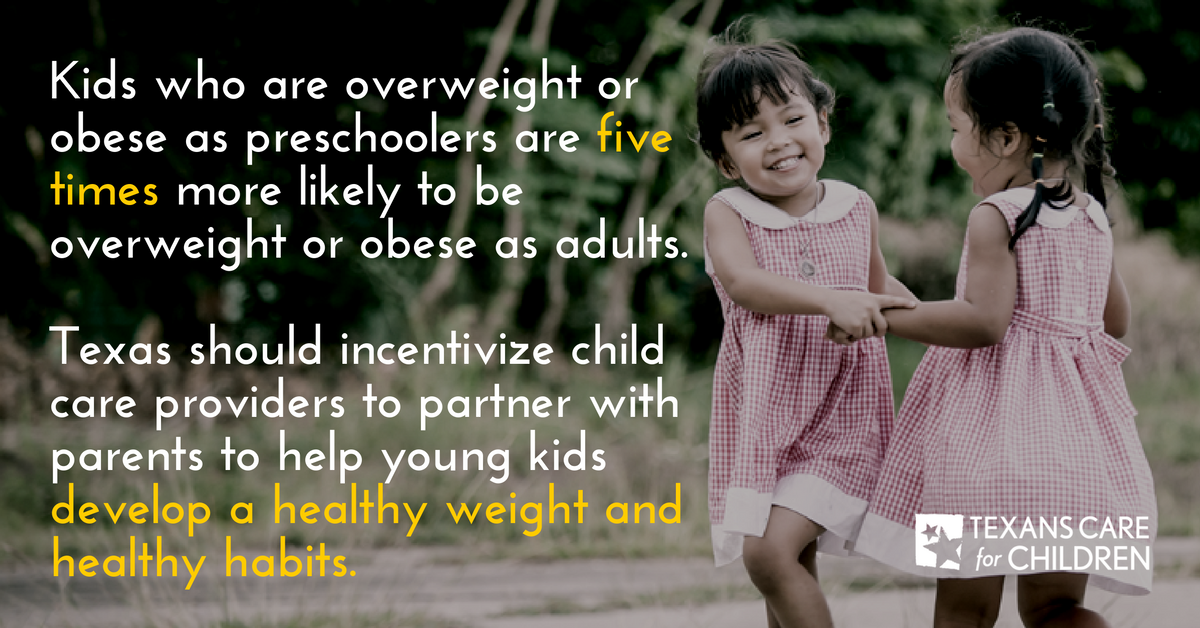Last updated March 13, 2017
Early experiences shape children for a lifetime. Helping kids learn healthy habits and achieve a healthy weight during the first years of life will help them stay healthy as they grow up. Children who are overweight or obese as preschoolers are five times more likely to be overweight or obese as adults.

Ensuring our youngest children have opportunities to eat nutritious foods, stay active, and develop healthy habits has many benefits.
- It reduces health care costs and facilitates a more productive workforce by preventing expensive chronic conditions. Overweight and obese children are at a higher risk of bone and joint problems, social and psychological conditions, and chronic conditions like heart disease, stroke, asthma, and certain forms of cancer. Helping kids start off at a healthy weight is essential for savings to our health care system, healthier students, and a more prosperous Texas.
- Establishing a healthy foundation in early childhood gives children a greater opportunity to succeed in school and later in the workplace. Being physically active and having a healthy diet before the age of five is associated with improved child development and cognitive outcomes. For example, research show that young kids that eat a healthy diet – high in lean protein and fresh fruits and vegetables – are more likely to have a higher IQ at age eight. In contrast, dietary patterns high in processed foods and added sugars are associated with lower school achievement and nonverbal reasoning. Research has shown that as the amount of television a young child watches increases so does the likelihood they will have a poor quality diet and risk for obesity. Children need to be engaged in interactive activities that promote brain and physical development, such as talking, playing, running, jumping, singing, and reading together in order to develop their muscles and minds.
Unfortunately, many young Texans are already at an unhealthy weight at an early age. About one in twelve kids age two to four have obesity – and, looking more broadly, one in four two-to-five-year-olds are overweight or obese. While this challenge is present in all Texas communities – rural, suburban, and urban – some Texas children are at a higher risk. In fact, one in seven children age two to four (14.9 percent) from low-income Texas families participating in the Women, Infant, and Children (WIC) program are obese, a rate that exceeds the national average for this age group.
Families’ difficulty obtaining healthy, nutritious foods on a daily basis exacerbates the challenge of childhood obesity. Many Texas families struggle to afford healthy, unprocessed foods, which tend to cost more on a per-calorie basis. Children of all backgrounds, including 17 percent of White children, live in families that struggle to consistently put food on the table. However, children of color in Texas, including 38 percent of Black children and 31 percent of Hispanic children, are at a higher risk of going to bed hungry on any given day.
Child care providers are a key partner for parents in helping young kids eat healthy, stay active, and maintain a healthy weight. Child care providers play a valuable role in the health and safety of young children. The majority of kids under age six spend much of their day in child care outside the home, where parents aren’t in charge of decisions about snacking on carrots or cookies and playing outside or watching a movie. In Texas, about one million young kids learn, play, and grow in licensed or regulated child care programs (child care centers or child care homes). Parents know their children deserve the benefits of healthy foods and active play time, and they want to know their child care providers are encouraging and reinforcing positive habits. To do this, child care providers and staff need the right tools, resources, and guidance to fulfill their important role.



